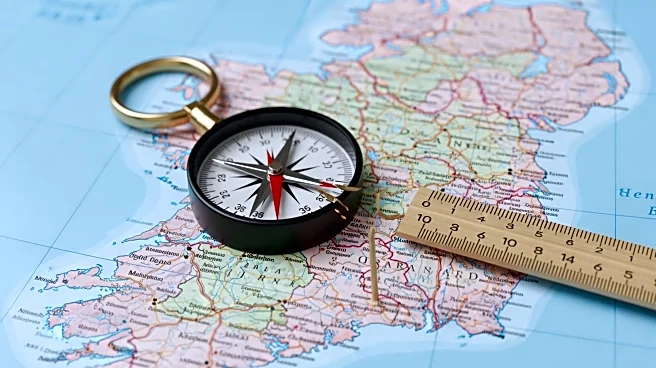What's Happening?
In 1925, the Irish Boundary Commission, established by the British and Irish governments, proposed changes to the Irish border, suggesting that small sections of Northern Ireland be transferred to the Irish Free State and vice versa. The commission, which
included representatives from both governments and Northern Ireland, spent months collecting testimonies from those living near the border. Despite the detailed proposals, the plan was leaked to the press, leading to public outcry and the eventual resignation of Eoin MacNeill, the Dublin government's representative. Ultimately, no changes were made, and the border remained as it was, reflecting the complexities and sensitivities surrounding the partition of Ireland.
Why It's Important?
The failure of the Irish Boundary Commission's proposals highlights the enduring challenges of border politics and the deep-seated divisions between unionists and nationalists in Ireland. The proposed changes, which were intended to address grievances from both sides, instead underscored the difficulties in achieving consensus on territorial adjustments. This historical episode is significant as it illustrates the complexities of national identity and territorial integrity, issues that continue to resonate in contemporary discussions about borders, particularly in the context of Brexit and its implications for the Irish border. The episode also serves as a reminder of the potential for political and social unrest when sensitive territorial issues are mishandled.
What's Next?
While the immediate consequences of the commission's failure were limited to maintaining the status quo, the broader implications have persisted over the decades. The unresolved issues of national identity and territorial claims continue to influence political discourse in Ireland and the UK. Future discussions about the border, especially in light of recent political developments like Brexit, may revisit the themes of the 1925 commission. Stakeholders, including political leaders and civil society groups, will likely continue to engage in dialogue to find sustainable solutions that respect the diverse identities and aspirations of the people living on both sides of the border.
Beyond the Headlines
The commission's work and its ultimate failure reveal deeper cultural and social dimensions, such as the impact of borders on daily life and community identity. The testimonies collected by the commission provide a window into the lived experiences of those affected by the partition, highlighting issues like economic disruption, cultural alienation, and the complexities of cross-border interactions. These narratives contribute to a broader understanding of how borders shape societies and the importance of considering human experiences in political decision-making.
















